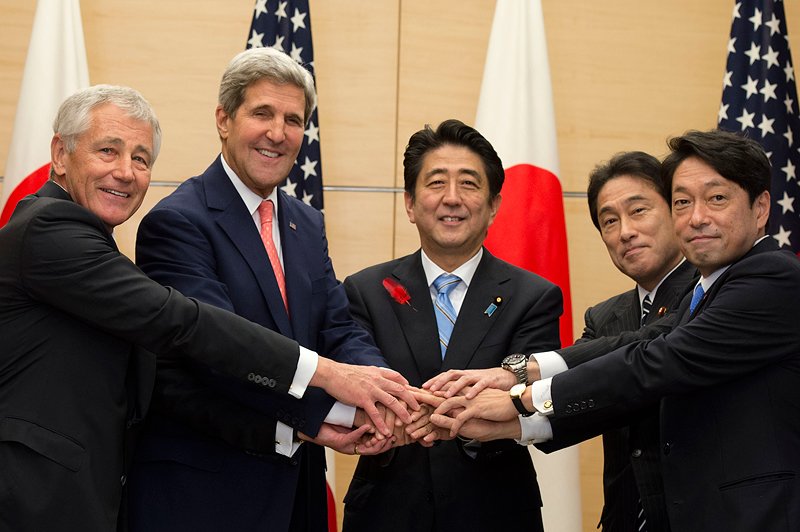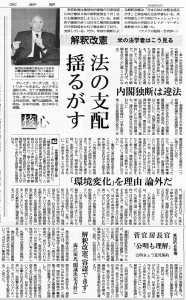 It was an interesting experience to speak on a panel addressing the climate change crisis as a national security issue, at the ABA Annual Review of National Security Law Conference, on Nov. 17, 2022, along with Mark Nevitt of Emory Law, Erin Sikorsky of the Center for Climate and Security, and Marcus King of Georgetown University. With over 300 people in the room, mostly national security lawyers, there was a surprising mix of views on how seriously one should take climate change as a threat to national security, or as an issue that implicate national security thinking! Very interesting.
It was an interesting experience to speak on a panel addressing the climate change crisis as a national security issue, at the ABA Annual Review of National Security Law Conference, on Nov. 17, 2022, along with Mark Nevitt of Emory Law, Erin Sikorsky of the Center for Climate and Security, and Marcus King of Georgetown University. With over 300 people in the room, mostly national security lawyers, there was a surprising mix of views on how seriously one should take climate change as a threat to national security, or as an issue that implicate national security thinking! Very interesting.
national security
Questioning U.S. Support for Japan’s National Security Moves
(Published in JURIST – Forum, Sept. 2, 2015)
 On August 30, tens of thousands of Japanese citizens demonstrated outside of the Diet (parliament), and in other cities across Japan, protesting against draft national security legislation that would expand the permissible operations of the Self-Defense Forces (SDF). The bills are the culmination of an effort by Prime Minister Shinzo Abe to expand Japan’s role in international collective security efforts. To do so, however, the government has sought to “reinterpret” Japan’s constitutional limits on the use of military force, in a manner that circumvents the formal constitutional amendment process, and thereby undermines the rule of law and constitutionalism in Japan.
On August 30, tens of thousands of Japanese citizens demonstrated outside of the Diet (parliament), and in other cities across Japan, protesting against draft national security legislation that would expand the permissible operations of the Self-Defense Forces (SDF). The bills are the culmination of an effort by Prime Minister Shinzo Abe to expand Japan’s role in international collective security efforts. To do so, however, the government has sought to “reinterpret” Japan’s constitutional limits on the use of military force, in a manner that circumvents the formal constitutional amendment process, and thereby undermines the rule of law and constitutionalism in Japan.
It is this process as much as the substance of the bills that has provoked the protests and triggered a constitutional crisis in Japan. Yet these developments have been largely welcomed in US policy circles. The objectives may be in America’s short-term interest, but a deeper understanding of the issues and a longer-term perspective would caution against US endorsement of this illegitimate process.
Constitutional Background
To understand the issues one has to begin with the constitutional limits. Article 9 of the constitutionrenounces war as a sovereign right of the nation, and the threat or use of force for the settlement of international disputes (Art. 9(1)). It also prohibits the maintenance of armed forces or other war potential (Art. 9(2)). These provisions have been consistently interpreted by the Cabinet Legislation Bureau (CLB) (which is loosely analogous to the US Office of Legal Counsel) and successive governments since the early 1950s, as meaning that Japan was entitled to use force for individual self-defense in the event of an armed attack on Japan; and that Japan was thus entitled to maintain a minimum level of armed forces necessary for such defense. This understanding was also implicitly confirmed by the Supreme Court in the Sunagawa decision, the only decision it has rendered on the issue. But the CLB has also clearly maintained that Art. 9(1) means that Japan is prohibited from any participation in collective self-defense as authorized by Article 51 of the UN Charter, or other collective security operations as authorized by the UN Security Council under Articles 39 and 42 of the UN Charter.
The Morality of Opposing Release of GITMO Detainees
(Cross-posted on Tumblr, Jan. 15, 2015)
It was announced this week that a number of Republicans, Senator McCain prominent among them, are seeking to pass legislation to prohibit further releases. The Paris attack last week is being used as a pretext. The specter of detainees “returning to the battlefield” and engaging in new acts of terrorism is the primary argument.
It was announced just today that five more detainees were released from Guantanamo Bay, some 6 years after they were cleared for release by an inter-agency review, and as much as 13 years after they were initially detained. The majority of detainees still at Guantanamo Bay are not terrorists affiliated with al-Qaeda or any other terrorist organization, and of course have not been charged with any crime. But Republicans want to ensure their continued and indefinite detention.
Undermining the Rule of Law – Tokyo Shinbun Interview
(Interview with Yoichi Takeuchi, in the Tokyo Shinbun, Jun. 30, 2014)
??????????????? ?????????????????????
??????????????????????????????????????????????????????????????????????????????????????????????????????????????????????????????????????????????????????????????????????????????????????????????????
???????????????????????????????????
????????????????????????????????????????????????????????????????????????????????????????????????????????????????????????????????????????????
????????????????????????????
????????????????????????????????????????????????????????????????????????????????????????????????????????????????????
??????????????????????????????????????????????

